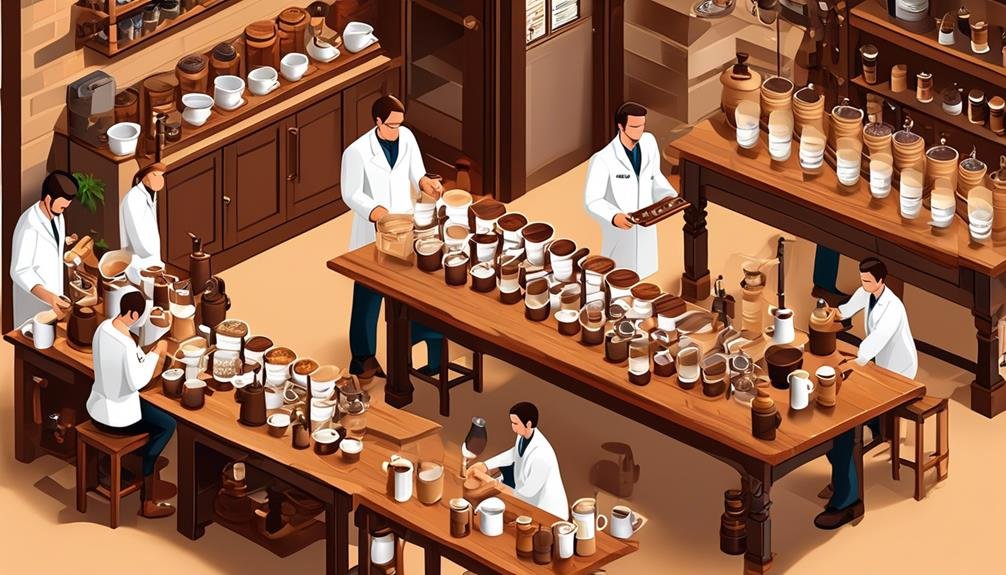Want to pursue a profession that's as flavorful as it is fascinating? Then becoming a certified coffee cupper might just be your cup of tea, or rather, coffee.
But how does one embark on this aromatic journey? Well, my friend, it involves a combination of curiosity, education, and experience.
So, grab your favorite mug, take a sip of anticipation, and let's explore the steps to becoming a certified coffee cupper.
Key Takeaways
- Research and choose a reputable coffee cupping certification program that covers sensory evaluation, flavor profiling, and quality assessment.
- Gain hands-on experience through participating in cupping sessions, attending workshops, and setting up cupping sessions at home.
- Prepare for the certification exam by practicing cupping regularly, familiarizing with the Coffee Taster's Flavor Wheel, and staying updated with industry trends.
- Continue education and professional growth by attending industry conferences, networking with professionals, and seeking opportunities for skill enhancement.
Understanding the Role of a Coffee Cupper
To truly understand the role of a coffee cupper, you must immerse yourself in the world of coffee tasting and become attuned to the intricacies of flavor profiles and aromas. A coffee cupper is an expert in evaluating the quality and characteristics of coffee beans. They possess a refined palate that can discern the subtle nuances in taste, acidity, body, and aroma. Their role is crucial in the coffee industry as they determine the grade and quality of coffee beans, ensuring that only the best make it to market.
As a coffee cupper, you'll be required to undergo rigorous training and certification to develop your tasting skills. You'll learn how to identify different coffee origins, such as Arabica or Robusta, and the distinct flavor profiles associated with each. You'll also become proficient in cupping techniques, which involve carefully evaluating the aroma, acidity, body, and aftertaste of coffee samples.
Being a coffee cupper requires a keen attention to detail and an ability to articulate your sensory experiences. You must be able to communicate your findings effectively to others in the industry, such as roasters or buyers, so that they can make informed decisions about the coffee beans they purchase.
Researching Coffee Cupping Certifications
When researching coffee cupping certifications, it's important to consider the credibility and reputation of the certifying organization. This ensures that the certification holds value and is recognized within the industry. To help you make an informed decision, here are three key factors to consider:
- Accreditation: Look for certifications that are accredited by respected organizations in the coffee industry. This ensures that the certification program meets certain standards and is recognized by professionals in the field.
- Curriculum: Evaluate the curriculum of the certification program. It should cover all aspects of coffee cupping, including sensory evaluation, flavor profiling, and quality assessment. A comprehensive curriculum will equip you with the necessary knowledge and skills to excel in the field.
- Industry Recognition: Consider the reputation of the certifying organization within the coffee industry. Do they have a strong network of professionals and partnerships with reputable coffee companies? Industry recognition can open doors for career opportunities and provide a solid foundation for your journey as a certified coffee cupper.
Meeting the Educational Requirements
As you embark on your journey to become a certified coffee cupper, one crucial aspect to consider is meeting the educational requirements necessary for this esteemed profession. To become a certified coffee cupper, you will need to acquire a deep understanding of coffee, its origins, flavors, and the cupping process itself. This requires a combination of formal education and hands-on experience.
A variety of educational programs are available to help you gain the necessary knowledge and skills. These programs typically cover topics such as coffee production, processing methods, sensory evaluation, and cupping techniques. Some institutions even offer specialized courses focused solely on cupping.
To give you a better idea of the educational options available, here is a table outlining a few well-known coffee cupping certifications:
| Certification | Institution | Description |
|---|---|---|
| Q Grader | Coffee Quality Institute (CQI) | Internationally recognized certification that covers all aspects of coffee quality, including cupping and sensory evaluation. |
| Specialty Coffee Association (SCA) | SCA | Offers various certifications, including the Coffee Skills Program, which covers cupping as one of its modules. |
| Coffee Quality Control (CQC) | Specialty Coffee Association of America (SCAA) | Provides comprehensive training on cupping and quality control in the coffee industry. |
| Coffee Taster's Flavor Wheel | SCA | A tool that helps coffee professionals develop their sensory skills and vocabulary for describing coffee flavors. |
Gaining Hands-on Experience in Coffee Cupping
Gaining hands-on experience in coffee cupping is an essential step towards becoming a certified coffee cupper, allowing you to apply your knowledge and refine your sensory skills in a practical setting. It's through this hands-on experience that you'll truly learn to assess and evaluate different coffee beans and their unique flavors.
To gain hands-on experience in coffee cupping, consider the following:
- Participate in cupping sessions: Find local coffee shops or roasters that offer cupping sessions. These sessions are usually led by experienced cuppers who'll guide you through the process and help you develop your palate.
- Attend workshops and training programs: Look for specialized workshops or training programs that focus on coffee cupping. These programs often provide a structured curriculum and hands-on practice to help you improve your cupping skills.
- Practice at home: Set up your own cupping sessions at home using different coffee beans. Experiment with different brewing methods and learn to identify different flavors and aromas. This will help you develop your sensory skills and gain a deeper understanding of coffee cupping.
Preparing for the Certification Exam
To prepare for the certification exam as a coffee cupper, you need to focus on studying and honing your sensory skills. The exam will test your ability to accurately identify and evaluate different coffee aromas, flavors, and characteristics. One of the first steps in your preparation should be to familiarize yourself with the Coffee Taster's Flavor Wheel, which is used as a reference guide to describe the various sensory attributes of coffee.
In addition to studying the flavor wheel, you should also practice cupping regularly. Cupping involves evaluating the aroma, taste, and body of different coffee samples. By cupping a variety of coffees, you can train your palate to identify subtle differences and develop a vocabulary to describe them.
To further enhance your sensory skills, you can also participate in sensory evaluation exercises. These exercises involve blind tasting different food and beverage samples to improve your ability to detect and describe flavors. This will help you become more attuned to the nuances of coffee.
Lastly, it's important to stay updated with the latest trends and developments in the coffee industry. Attend workshops, seminars, and cupping events to expand your knowledge and network with other coffee professionals.
Continuing Education and Professional Growth
Now that you have successfully prepared for the certification exam as a coffee cupper, it's time to explore the opportunities for continuing education and professional growth in the industry. As the coffee industry evolves and new trends emerge, it's important to stay updated and enhance your skills. Here are three avenues for further development:
- Attend industry conferences and workshops: These events provide a platform to learn from industry experts, network with professionals, and gain insights into the latest advancements. Conferences like the Specialty Coffee Association Expo offer a wide range of educational sessions and workshops tailored to different aspects of coffee cupping and tasting.
- Join professional organizations: Membership in organizations such as the Roasters Guild or the Specialty Coffee Association provides access to a wealth of resources, including online courses, webinars, and forums where you can engage with fellow cuppers and stay informed about industry developments.
- Participate in cupping competitions: Competing in coffee cupping competitions not only allows you to showcase your skills but also exposes you to different coffee varieties and flavor profiles. These competitions often provide valuable feedback from experienced judges, helping you refine your cupping techniques and expand your palate.
Continuing education and professional growth are essential for a coffee cupper. By taking advantage of these opportunities, you can stay at the forefront of the industry and continue to refine your craft.
Frequently Asked Questions
Can I Become a Certified Coffee Cupper Without Any Prior Knowledge or Experience in the Coffee Industry?
Yes, you can become a certified coffee cupper without any prior knowledge or experience in the coffee industry. It will require dedication, training, and a passion for learning about the intricate flavors and aromas of coffee.
Are There Any Specific Age Requirements to Become a Certified Coffee Cupper?
There are no specific age requirements to become a certified coffee cupper. As long as you have the passion and willingness to learn about coffee tasting, you can pursue certification at any age.
How Long Does It Typically Take to Complete the Certification Process and Become a Certified Coffee Cupper?
It typically takes a few months to complete the certification process and become a certified coffee cupper. During this time, you will learn about tasting techniques, coffee origins, and industry standards.
Is It Possible to Obtain a Coffee Cupping Certification Online, or Is It Only Available In-Person?
You can obtain a coffee cupping certification online or in-person. Online courses provide convenience and flexibility, while in-person training offers hands-on experience. Both options ensure you gain the necessary knowledge and skills to become a certified coffee cupper.
Are There Any Opportunities for Networking and Connecting With Other Certified Coffee Cuppers Once I Become Certified?
Once you become certified as a coffee cupper, there are plenty of opportunities to network and connect with other certified professionals. You can attend coffee events, join industry organizations, and participate in online communities to meet and learn from fellow cuppers.
Conclusion
Becoming a certified coffee cupper requires dedication, education, and experience. By understanding the role of a coffee cupper and researching certifications, you can find the right program to meet your educational requirements.
Gaining hands-on experience in coffee cupping is crucial to honing your skills, and preparing for the certification exam will ensure your success.
Remember to continue your education and seek professional growth opportunities to stay up to date in the ever-evolving world of coffee cupping.




